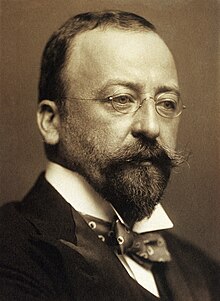Henry Head
Sir Henry Head (born August 4, 1861 in London , † October 8, 1940 in Hartley Court near Reading ) was an English neurologist.
Life
Henry Head was born into a Quaker family in Stamford Hill, London . The young Henry won a science scholarship to the Charterhouse School and then a vacancy at Trinity College Cambridge . In Cambridge he had the physiologists Michael Foster , Walter Gaskell (1847-1914) and John Newport Langley as a teacher . Head then went to the German Charles University in Prague for two years , where he worked for the physiologist Ewald Hering and did research in the field of respiratory physiology .
After his return to England he worked in various departments of the University College Hospital in London, in 1890 he passed his state examination . Immediately afterwards he turned to a clinical examination of the hypersensitive (hypersensitive) skin zones in various diseases of the abdominal organs. With this work he achieved his doctorate in Cambridge in 1890 ; at the same time his name was immortalized in neurology: Head zones . In the next few years he devoted himself to research on the physiology of the afferent pathways, whereby the observation of several cases of herpes zoster enabled him to delimit the dermatomes .
In 1896 he became head lecturer at the Whitechapel Medical School and assistant physician at the London Hospital, in 1899 a member of the Royal Society of Medicine. A year later he became a Fellow of the Royal College of Physicians (FRCP) and received the Goulstonian Lecturer award. Head carried out his most important research after 1900 together with Gordon Holmes . A new conception of the loss of sensitivity when the highest centers are disturbed was developed, which led to the concept of a “body scheme”.
When war broke out in 1914, Henry Head was appointed Consultant Physician at Empire Hospital in London. He mainly dealt with the physiological problems of cross-sectional injuries of the spinal cord . After the war ended, Head's attention turned to the problem of aphasia . Head began with an extensive critical review of the history of aphasia. He disapproved of the systematizations proposed by Pierre Marie , Carl Wernicke and many others. Aphasic disorders were not suitable for simple descriptive classifications such as "motor" and "sensitive" or "executive" and "espressive". Head concluded that in cases of aphasia it is not really general intellectual abilities that suffer, but just a mechanism by which certain sub-expressions of mental activity are brought into play.
From 1921 onwards, a sedentary lifestyle was increasingly observed at Head, which in the following period turned out to be a sign of Parkinson's disease . During his long-term disability, he maintained his intellectual interests. In 1927, the king raised him to the personal nobility status as a Knight Bachelor ("Sir"). In 1932 he was elected a member of the Leopoldina . In 1928 the Head family moved to Hartley Court to be closer to London. Henry Head died at the age of 80 on October 8, 1940.
Works
- On the regulation of respiration. In: The Journal of Physiology , 1889, 10: 1-70, 279-290.
- On the disturbances of sensation, with special reference to the pain of visceral disease. Thesis for MD Brain, Oxford, 1893, 16: 1-133. Brain, Oxford, 1894, 17: 339-480. Brain, Oxford, 1896, 19: 153-276. (German: The sensitivity disorders of the skin in visceral diseases. Translated by Friedrich Wilhelm Seiffer with a foreword by Julius Eduard Hitzig . Berlin, Hirschwald, 1898.)
- Together with Alfred Walter Campbell (1868–1937): The pathology of herpes zoster and its bearing on sensory location. Brain, London, 1900, 23: 353-523.
- Together with William Halse Rivers Rivers (1864-1922) and James Sherren (1872-1945): The afferent nervous system from a new aspect. Brain, London, 1905, 28: 99-115.
- Together with James Sherren: The consequences of injury to the peripheral nerves in man. Brain, London, 1905, 28: 116-138.
- William Halse Rivers Rivers and Sir Henry Head: A human experiment in nerve division. Brain, London, 1908, 31: 323-450.
- Henry Head and Harold Theodore Thompson (1878–1935): The grouping of afferent impulses within the spinal cord. Brain, 1906, 29: 537-741.
- Henry Head and Gordon Morgan Holmes : Sensory disturbances from cerebral lesions. Brain, 1911, 34: 102-254.
- Henry Head, in conjunction with William Halse Rivers Rivers , Gordon Morgan Holmes , James Sherren, Theordoe Thompson, George Riddoch: Studies in Neurology . 2 volumes. London, H. Frowde, Hodder & Stoughton, 1920; https://archive.org/stream/studiesinneurolo01headiala#page/n7/mode/2up .
- Aphasia and kindred disorders of speech . 2 volumes. Cambridge University Press London, 1926.
literature
- Werner E. Gerabek : Head, Henry. In: Werner E. Gerabek, Bernhard D. Haage, Gundolf Keil , Wolfgang Wegner (eds.): Enzyklopädie Medizingeschichte. De Gruyter, Berlin / New York 2005, ISBN 3-11-015714-4 , p. 539.
- Holger Münzel: Max von Frey. Life and work with special consideration of his sensory-physiological research. Würzburg 1992 (= Würzburg medical-historical research. Volume 53), p. 187.
Web links
Individual evidence
- ↑ Knights and Dames: HA-HOR at Leigh Rayment's Peerage
- ↑ ling.fju.edu: Head. Biography . 2000.
| personal data | |
|---|---|
| SURNAME | Head, Henry |
| BRIEF DESCRIPTION | English neurologist |
| DATE OF BIRTH | 4th August 1861 |
| PLACE OF BIRTH | London |
| DATE OF DEATH | October 8, 1940 |
| Place of death | Reading |
